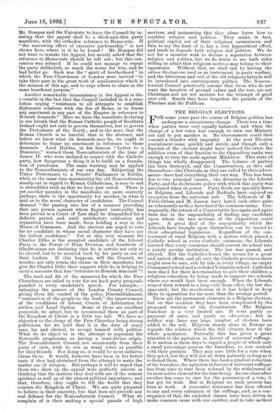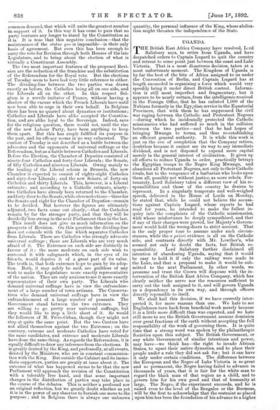THE BELGIAN ELECTIONS. F OR some years past the course of
Belgian politics has undergone a conspicuous change. There was a time when parties were very equally balanced, and when the change of a few votes was enough to turn one Ministry out and to put another in. No Government could then commit a blunder with impunity. At the next Election punishment came quickly and surely, and though only a„ fraction of the electors might have noticed the error, the addition even of that fraction to the Opposition ranks was- enough to turn the scale against Ministers. This state ot things has wholly disappeared. The balance of parties- has been destroyed, and the Conservatives, as they call themselves—the Clericals, as they are called by their adver- saries—have had everything their own way. This has been due to two principal causes,—the divisions in the Liberal Party, and the doctrinaire policy with which that party was associated when in power. Party feuds are specially fierce in Belgium, and Liberals and Radicals have enjoyed no exception from the universal rule. The followers of M. Frere-Orban and M. Janson have hated each other quite as vehemently as they have hated the common enemy. Con- sequently, the return of a Conservative has again and again. been due to the impossibility of finding any candidate upon whom the two sections of the Opposition could.1 agree. A great deal of the unpopularity which the Liberals have brought upon themselves can be traced to- their educational legislation. Regardless of the con- tentment of rural Belgium with a system which placed a Catholic school in every Catholic commune, the Liberals insisted that every commune should convert its school into • a purely secular institution. The law was passed, and obeyed. But the Catholics found the means for a great and united effort, and all over the Catholic provinces there might soon be seen, side by side in every village, an empty Communal school and acrowded Voluntary school. Catholics were fined for their determination to give their children a, religious education, by being made to support two schools where one would have been enough. When the Liberals. reaped their reward in a long exile from office, the law dis- appeared; but the recollection of it has helped to keep them in opposition for far more than the average period. These are the permanent elements in a Belgian election, but on this occasion they have been complicated by the proposed revision of the Constitution. The Belgian franchise is a very limited one. It rests partly ort, payment of rates, and partly on education ; but in neither way have any large number of electors been added to the roll. Belgium stands alone in Europe as regards the relation which the full citizens bear to the whole population. Naturally this has given a great stimulus to the agitation in favour of universal suffrage.. It is useless in these days to expect a people of which only, a small percentage possess the franchise, to rest content with their position. They may care little for a vote when they get it, but they will not sit down patiently so long as it is denied them. Where there has been a gradual reduction, of the franchise, the agitation in favour of universal suffrage has from time to time been reduced by the withdrawal of its most active element for the time being. As one class after another has come to care for the possession of a vote, it, has got its wish. But in Belgium no such process has been at work. A successful resistance has been offered to any and every extension of the suffrage, and, as a con- sequence of this, the excluded classes have been driven to make common cause with one another, and to take as their common demand, that which will unite the greatest number in support of it. In this way it has come to pass that no party ventures any longer to stand by the Constitution as it is. It is true that this negative conclusion—that the maintenance of the status quo is impossible—is their only basis of agreement. But even this has been enough to carry the vote for Revision through both Houses of the late Legislature, and to bring about the election of what is virtually a Constituent Assembly.
The two most important features of the proposed Revi- sion are the reduction of the franchise and the substitution of the Referendum for the Royal veto. But the elections of Tuesday seem to have had very little reference to either. The dividing-line between the two parties was drawn exactly as before, the Catholics being all on one side, and the Liberals all on the other. In this respect Bel- gium is a servile imitator of France, without having a shadow of the excuse which the French Liberals have until now been able to urge in their own behalf. In Belgium there has been no quarrel about dynasties or institutions ; Catholics and Liberals have alike accepted the Constitu- tion, and are alike loyal to the Sovereign. Indeed, save for the religious question, there would not, until the rise of the new Labour Party, have been anything to keep them apart. But this has amply fulfilled its purpose in the past, and its efficacy seems in no way exhausted. The contest of Tuesday is not described as a battle between the advocates and the opponents of universal suffrage or the Referendum, but as a battle between Catholics and Liberals. Before the Election, the Chamber of Deputies consisted of ninety-four Catholics and forty-four Liberals ; the Senate, of fifty Catholics and nineteen Liberals. Owing mainly to the healing of the Liberal schism in Brussels, the new Chamber is expected to consist of eighty-eight Catholics and sixty-four Liberals ; and the new Senate, of forty-six Catholics and thirty Liberals. This, however, is a Liberal estimate ; and according to a Catholic estimate, ninety- two Catholics have already been returned to the Chamber, and forty-four to the Senate, while eleven elections—three for the Senate and eight for the Chamber of Deputies—remain to be decided. But however the figures are ultimately adjusted, two facts come out clearly,—that the Catholics remain by far the stronger party, and that they will be decidedly less strong in the next Parliament than in the last.
This result does not give us much information on the prospects of Revision. On this question the dividing-line does not coincide with the line which separates Catholics from Liberals. There are Catholics who strongly advocate universal suffrage ; there are Liberals who are very much afraid of it. The Extremes on each side are distinctly in favour of it ; the more moderate on each side wish to surround it with safeguards which, in the eyes of its friends, would deprive it of a great part of its value. The truth is, that both extremes hope to gain by its adop- tion. Both, it may safely be said, are guiltless of any wish to make the Legislature more exactly representative of the nation. They are only anxious to see it more exactly representative of their own party. The Liberals who demand universal suffrage have in view the enfranchise- ment of a large number of town artisans. The Conserva- tives who demand universal suffrage have in view the enfranchisement of a large number of peasants. The Government stand between the two extremes. They are willing to go pretty near universal suffrage, but they would like to stop a little short of it. So would the followers of M. Frere-Orban, though they might not stop at quite the same point. But the two Centres have not allied themselves against the two Extremes ; on the contrary, extreme and moderate Catholics have voted for the same candidates, and extreme and moderate Liberals have done the same thing. As regards the Referendum, it is equally difficult to draw any inference from the elections. It is greatly desired by the King, and professedly, at all events, desired by the Ministers, who are in constant communica- tion with the King. But outside the Cabinet and its imme- diate supporters, parties are greatly at issue about it. The outcome of what has happened seems to be that the new Parliament will approach the revision of the Constitution with a tolerably free hand, and that some important changes in the distribution of parties may take place in the course of the debates. This is neither a profound nor an original reflection, but we greatly doubt whether as yet it is in the power of any observer to furnish one more to the purpose ; and in Belgium there is always one unknown quantity, the personal influence of the King, whose abdica- tion might threaten the independence of the State.







































 Previous page
Previous page